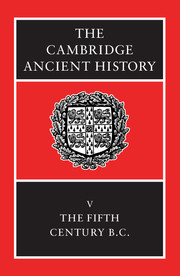Book contents
- Frontmatter
- Contents
- List of maps
- List of text-figures
- Preface
- 1 Sources, chronology, method
- 2 Greece after the Persian Wars
- 3 The Delian League to 449 b. c.
- 4 The Athenian revolution
- 5 Mainland Greece, 479–451 b. c.
- 6 The Thirty Years' Peace
- 7 Sicily, 478-431 b.c.
- 8 Greek culture, religion and society in the fifth century b.c.
- 8a Art: Archaic to Classical
- 8b Classical Cities and Sanctuaries
- 8c Rebuilding in Athens and Attica
- 8d Panhellenic Cults and Panhellenic Poets
- 8e Athenian Cults and Festivals
- 8f Athenian Religion and Literature
- 8g Society and Economy
- 8h Athens as a Cultural Centre
- 9 The Archidamian War
- 10 The Peace of Nicias and the Sicilian Expedition
- 11 The Spartan Resurgence
- Chronological Notes
- Chronological Table
- BIBLIOGRAPHY
- Index
- 1 Greece and Western Asia Minor
- References
8e - Athenian Cults and Festivals
from 8 - Greek culture, religion and society in the fifth century b.c.
Published online by Cambridge University Press: 28 March 2008
- Frontmatter
- Contents
- List of maps
- List of text-figures
- Preface
- 1 Sources, chronology, method
- 2 Greece after the Persian Wars
- 3 The Delian League to 449 b. c.
- 4 The Athenian revolution
- 5 Mainland Greece, 479–451 b. c.
- 6 The Thirty Years' Peace
- 7 Sicily, 478-431 b.c.
- 8 Greek culture, religion and society in the fifth century b.c.
- 8a Art: Archaic to Classical
- 8b Classical Cities and Sanctuaries
- 8c Rebuilding in Athens and Attica
- 8d Panhellenic Cults and Panhellenic Poets
- 8e Athenian Cults and Festivals
- 8f Athenian Religion and Literature
- 8g Society and Economy
- 8h Athens as a Cultural Centre
- 9 The Archidamian War
- 10 The Peace of Nicias and the Sicilian Expedition
- 11 The Spartan Resurgence
- Chronological Notes
- Chronological Table
- BIBLIOGRAPHY
- Index
- 1 Greece and Western Asia Minor
- References
Summary
CONTINUITY AND CHANGE
Although what follows concentrates on the fifth century, it has to be seen in a larger perspective. Religious ritual is conservative and may survive for uncounted generations; its authority, for Greeks, is simply traditional custom, nomos. It shapes society, but it is also affected by all changes on the political, economic or intellectual level. From the earliest times on, ritual activity concentrates on special occasions that stand out from everyday life and serve as markers in the flux of time – the festivals. The basic elements of these are simple: processions, dances, vows and prayers, animal sacrifices with feasting, and contests (agones) of various kinds; yet special variants and combinations make up a system of impressive complexity, characterizing the group or city concerned as well as the gods and heroes addressed in the cult.
The rituals of Greek polis festivals contain elements of great antiquity. Particular traits of animal sacrifice as found especially in the Athenian ceremony of ‘ox-murder’, Buphonia, have been traced to the palaeolithic period, and the women's festival of Thesmophoria has been credited with a ‘stone age’ character, too. We are on firmer ground in stating that the linguistic form to designate festivals in Greek, especially the suffix -teria, had been established by the Mycenaean epoch. The form of months' names derived from festivals, with the suffix -(ter)ion, is secondary, but still common to Athens and the Ionians from the islands and Asia Minor and must thus go back to the beginning of at least the first millennium.
Keywords
Information
- Type
- Chapter
- Information
- The Cambridge Ancient History , pp. 245 - 267Publisher: Cambridge University PressPrint publication year: 1992
References
Accessibility standard: Unknown
Why this information is here
This section outlines the accessibility features of this content - including support for screen readers, full keyboard navigation and high-contrast display options. This may not be relevant for you.Accessibility Information
- 3
- Cited by
